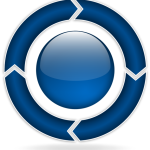Resume updates: They have a lifecycle, just like anything else on this planet.
You write your resume.
You get a job.
You forget about the resume.
Then all of a sudden, you need it for either a job opportunity that comes along, or a job search that gets kicked off.
Love ’em or hate ’em, resume updates are a necessary evil that everyone, sooner or later, will have to deal with.
But what most people don’t realize is that there are some really important things that you need to be doing BEFORE you jump into resume updates at any point in your career.
It requires being proactive. Thoughtful. And mindful of what you are doing in the present moment which directly impacts your future.
Resume updates mean that you need to start keeping track of your accomplishments NOW, so you don’t wrack your brain later trying to remember what you’ve been doing for the past few years. (Sound familiar?)
Here are some tips on what you need to have before you even start resume updates.
First, create a file that is your “Career Management” file. This is going to be your braintrust and memory-prompter of everything you’ve done. Things to put in this file (it can be a hard file or a computer file on your own thumbdrive, of course!):
1. Staff reports
2. Plan of Work
3. Budgets
4. Performance reviews
5. Project recaps
6. Kudos letters or notes from supervisors, colleagues, clients, or co-workers
7. Any formal goal-setting materials used to drive your work and its outcomes
8. Copies of any registrations for conferences, workshops, training sessions, industry certifications, internal corporate learning university sessions, conventions, classes, etc. that has added to your body of knowledge. Don’t go back more than 5-7 years ago, however. You want to be able to show current job knowledge!
9. Any awards (plaques, certificates, recognition) that you’ve received from your company, industry, peers, or supervisors. To be clear, this does not mean a $25 gift certificate to Applebee’s – we’re talking more about Employee of the Month kind of stuff.
10. Copies of contracts or programs where you’ve been a featured speaker.
11. Copies of articles that you’ve either been quoted, authored, or featured.
12. Documentation of any promotions, job title changes, or departmental shifts so you have exact dates.
Having these pieces of information will make your life so much easier for future resume updates. All of the information will be in one centralized spot which will eliminate hours of digging up information in what seems like an archaeological expedition. Especially when some resume updates need to take place quickly, you might waste precious time trying to pull information that isn’t immediately accessible.
So be kind to yourself.
Make a promise and follow through on your commitment to yourself: plan for future resume updates by having a ready-to-go file that has all of your top info at your finger tips.
And better yet: craft resume updates every few months, so it’s already a habit and your resume is ready to go at any notice.
